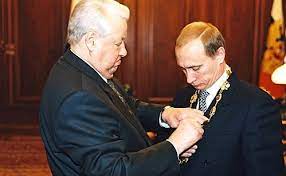In the year 2000, Vladimir Putin ascended to the presidency of the Russian Federation, a pivotal moment that would define the trajectory of the nation for decades to come. Taking the helm after a tumultuous period marked by economic instability and political chaos, Putin promised stability, security, and a return to greatness for Russia. Little did the world know then that his presidency would reshape the country’s political landscape and assert Russia’s presence on the global stage.
Putin’s first years in office were characterized by assertive governance and a crackdown on internal dissent. He centralized power, reined in oligarchs, and established control over key sectors of the economy. His efforts to stabilize the country’s economy, buoyed by rising oil prices, brought about a period of prosperity and growth, earning him widespread popularity among the Russian populace.
Internationally, Putin pursued a policy of restoring Russia’s influence and standing as a global power. He deftly navigated geopolitical challenges, positioning Russia as a counterbalance to Western dominance. His assertive foreign policy, exemplified by the annexation of Crimea in 2014, demonstrated Russia’s willingness to challenge the established world order.
However, Putin’s tenure has been marred by accusations of authoritarianism and human rights abuses. Critics point to the suppression of political opposition, curtailment of press freedom, and the erosion of democratic institutions as evidence of Putin’s authoritarian tendencies. The Kremlin’s heavy-handed approach to dissent, including the poisoning and imprisonment of political opponents, has drawn condemnation from the international community.
Economically, Russia’s overreliance on energy exports has left the country vulnerable to fluctuations in global oil prices. Despite efforts to diversify the economy, progress has been slow, hindered by corruption, bureaucratic inefficiency, and Western sanctions imposed in response to Russia’s actions in Ukraine and elsewhere.
Putin’s legacy is a complex tapestry of successes and shortcomings. Under his leadership, Russia has regained its status as a formidable player on the world stage, challenging Western hegemony and asserting its interests with confidence. Yet, this resurgence has come at a cost, as Russia grapples with internal divisions, economic stagnation, and isolation on the global stage.
As Putin’s presidency enters its third decade, the question of succession looms large. Whether he chooses to step down or continues to wield power, Putin’s impact on Russia is indelible, shaping the country’s trajectory in ways that will reverberate for generations to come. Whether viewed as a saviour or a despot, one thing remains clear: Vladimir Putin has left an indelible mark on the history of Russia.
newshub



Recent Comments